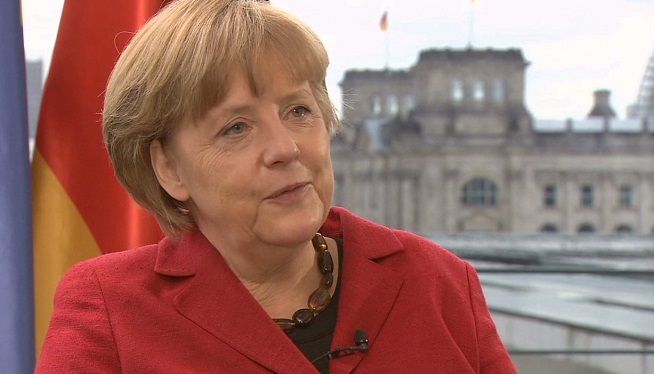(CNN) — German Chancellor Angela Merkel is on course for a fourth term in office against the backdrop of a surge in support for the far-right, exit polls in the German election suggest.
Merkel’s CDU party and its sister CSU are predicted to be the largest in the German parliament, the Bundestag, with 33.5% of the seats. The CDU’s coalition partner, the SPD, fell to 21%, a result met with shock at the party’s headquarters.
Alternative for Germany (AfD) is predicted to become the first far-right party to win seats in the Bundestag since 1960, with about 13% of seats, according to FORSA polling institute data commissioned by German public broadcaster ZDF.
Merkel said the result gave her a “mandate” to govern but that the AfD result would require “thorough analysis” to understand the concerns of their voters.
Addressing her supporters, Merkel pledged to try and understand the concerns of voters who lent their support to the AfD.
“There’s a big new challenge for us, and that is the entry of the AfD in the Bundestag,” she said.
“We want to win back AfD voters.”
‘Jamaica coalition’
SPD leader Martin Schulz said the result was a “bitter disappointment” and the party would return to opposition. He lamented the success of the AfD, adding that it was a watershed moment.
With the SPD refusing to rejoin a coalition and no party willing to work with the AfD, it leaves Merkel with few options for a coalition.
The exit polls would suggest that Merkel may be forced to make a deal with the Green Party and FDP, to create a so-called “Jamaican coalition” — with the green and and yellow of the two parties combining with the black of the CDU to resemble the flag of Jamaica.
The pro-business FDP are expected to take 10% of seats with the Greens one percentage point behind on nine.
Rise of AfD
The success of the AfD was declared as a “political earthquake” by Georg Pazderski, the local party leader in Berlin.
Figures show 21.5% of East Germans, including Berlin, voted for the far-right party, while 11% voted for the AfD in the West, according to exit polls done by Infratest Dimap.
Founded in 2013, the AfD has enjoyed a surge of support for its anti-immigration stance and its opposition to Merkel’s decision to open the country’s borders to over a million migrants, mainly those fleeing violence and persecution from the Middle East.
The AfD, which has also been accused of Islamophobia, garnered staunch support in east Germany where it became the second largest party after the CDU.
“For the first time, we have a conservative party right beside our Christian Democrats and this is because they moved more and more to the left and we moved into the vacuum,” Pazderski told CNN
“It’s a good day for democracy for Germany and for Europe.”
Coalition talks are unlikely to begin in earnest until final results have been announced on Monday.
To form a government, the parties involved must have a combined total of at least 50% of the seats in parliament.
There are likely to be several coalition options, and plenty of disagreement between the parties before they reach a deal.
Parliament will reconvene on October 24 with the new government in place.





















